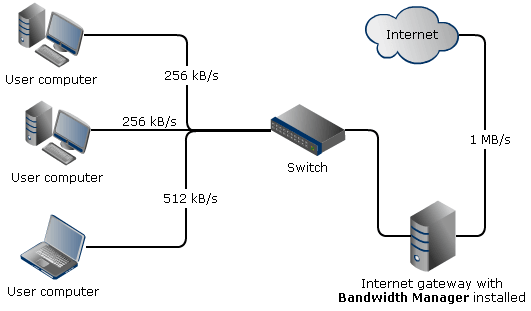Who doesn't want as many website visitors as possible? Especially when you are an ecommerce store owner - more visitors mean more leads and more sales.
But your visitors will convert depending on various factors, out of which the most important one is good user experience. This is where websites utilize bandwidth. The more the bandwidth - the better your website will perform.
When you work with the top hosting providers in the UK, you barely need to focus on this technical aspect because they provide you with bandwidth limits according to your website requirements.
But wait! What exactly is bandwidth?
Read on to clear your doubts!

What is Website Bandwidth?
"Website bandwidth" is a term used to describe the amount of data that can be moved from one location to another every second.
It's typically measured in gigabytes, but it can also be measured by its maximum transfer rate – maximum throughput – which is normally represented as Mb/s (megabits per second).
But before we move forward, let me state that a website's bandwidth is sometimes incorrectly called data transfer rate or download speed. These terms aren't quite accurate because they don't indicate how many bits per second are being transferred from one place to another.
In this website bandwidth guide, we’d explain terms commonly associated with bandwidth in a website context i.e., gigabytes and megabits.
What are Gigabytes?
In a website bandwidth context, the term "gigabyte" refers to a unit of data that's equivalent to 1024 megabytes (1024*1024 =1073741824). Also, 1 gigabit equals 1000 megabits, and 1 gigabyte equals 1000 megabytes.
What are Megabits?
A "bit" (short for "binary digit") isn't the same thing as a byte, which consists of 8 bits. A bit can have only one of two possible values: 1 or 0; whereas, a byte contains 8 bits that can each contain their own unique value, which can range from 0 to 255.

Why is Website Bandwidth Important?
When you run a website, it is important to have good bandwidth so that more people can visit your site without worrying about how fast or slow the loading of your site would be.
Having a lot of visitors on a single site may not only cause lag but also affect users' experience in a negative way.
In addition to this, a website which is constantly loading can cause additional stress on servers and its bandwidth which results in increased cost of running the site.
It can lead to a situation where you will have maximum visitors on your website at the same time causing it to lag forcing users to leave resulting in loss of potential business.
In order for visitors to have a good experience, it is important that you have a good bandwidth so that the demand for good user experience does not exceed the capacity of your site.
For example, if it takes 5 seconds to load a 1 Mb/s website on a 4 Mb/s connection, getting more bandwidth will help reduce load time.
Wondering what amount of bandwidth does your website need to run properly?
The easiest way to calculate your bandwidth needs is through these simple steps:
Step 1: First, locate the "bandwidth" value in your hosting account. This is typically shown as total bandwidth and can be found on the main control panel of your c-panel.
Step 2: If you have 100 MB of bandwidth, you can handle 100 megabytes of data transfer every month. That's not bandwidth in bits per second. 100 megabytes equals 102400 kilobytes, which means that the "100 mb of bandwidth" you have equals 0.1024 gigabytes every month.
Step 4: Divide your total monthly bandwidth by 30 (for example, if your total bandwidth is 10 GB/month, divide this by 30 to get your average daily bandwidth, which is about 333.3 MB/day or 32.4 MB/hour).
Step 4: Get the estimated number of unique visitors your site gets in a month. Multiply this figure with 5 since each unique visitor will be able to view your site five times (5x).
Your new figure is the number of views your website can get in a month.
Now multiply this amount with 30 since each view is equal to 30 seconds in terms of bandwidth (5x30=150) Your final number would be the estimated amount of bandwidth that you would require in a month.
Here is an example:
Estimated Number of Uniques in a Month- 100,000
100,000x30=3,000,000
Your final figure would be 3 million which means that if your website is hosted on a shared hosting with less bandwidth, then your website might experience downtime which will cause a significant loss of potential business.
What is an Average Bandwidth?
Average bandwidth is simply the number you get after you divide your total monthly bandwidth by the number of days in that month (for example, if you have 100 MB of bandwidth and 30 days in the month, you divide 100/30).
The minimum bandwidth you need will vary depending on your business needs. If you have a very small website that gets low traffic, you might only need 100 KiB/s (equivalent to approximately 1 Mb/s).
However, if you go over your monthly bandwidth limit, you'll typically have to pay a surcharge. This can vary from provider to provider.
At the very least, it will disrupt the speed of your website.
Usually, your web hosting providers in the UK will keep you abreast of everything beforehand so your investment is safe and your website performs optimally.
How Do You Calculate Bandwidth?
This is the million-dollar question that most website owners ask when looking to choose a web hosting company.
Many website owners seek advice on choosing the right hosting company for their site, but find it hard to get an answer. Why?
This is because it seems simple enough, right? Just pick a company that offers enough bandwidth to cover your site's traffic, and you should be good... right?
The answer is actually more complicated than that, and is made even more difficult because different hosting companies define bandwidth in different ways.
To truly determine how much bandwidth you need, you would need to know how much traffic your site receives and the size of each file that is downloaded.
To simplify this somewhat, we'll use a rough estimate based on the number of file downloads.
For example: If your website averages 100 downloads per day, you will require approximately 3GB of bandwidth. This would be equivalent to about 30GB per month.
Note that this is only a rough estimate; your needs may be higher or lower, but you should also consider other factors like file size and how much space your website takes up on the server.
Beyond bandwidth, there are other factors to consider when choosing a hosting company such as speed and uptime, which can also affect your site's ranking on search engines as well as its usability.
Why Do You Need More Bandwidth?
If you are an ecommerce store or even running your own blog with multiple pages, having a lot of bandwidth is crucial for you.
Here are the reasons that justify having more bandwidth will save you in the long run.
Reach more organic leads: If you have low bandwidth, your website won't reach many people, especially if it has a lot of pictures, videos, infographics, and other multimedia.
But if you have high-bandwidth internet with unlimited usage, feel free to add as much content as needed and you won’t need to worry about speed optimization!
No crashing issues: Websites with low bandwidth have chances of crashing if it gets unusual visitors on any particular day.
Can you miss good leads or perhaps conversions? Who knows? So, that is another reason you need a lot of bandwidth.
How to Select the Web Hosting Providers with Right Bandwidth Needs?
Usually, companies offer you two types of bandwidth plans that are unmetered bandwidth and metered bandwidth.
Unmetered Bandwidth
Unmetered bandwidth simply means the web host provider is not monitoring bandwidth usage for you. Even if you exceed the limitation of 20 GB or more.
Metered Bandwidth
On the other hand, metered bandwidth has some limitations where you usually cannot exceed the limit of 10 or 15 GBs depending on your plan.
But which plan is suitable for your website? It will help if you keep these factors in mind while choosing the web host with the right amount of bandwidth.
1) Bandwidth usage by your website: Be sure to check the bandwidth usage of your website at least 3 months before signing up for new hosting plans.
If you find out that you are coming close to exceeding your allotted bandwidth, it's time to look for a reliable hosting provider in the UK that allows you to increase bandwidth limits.
2) Control panel: Control panel of a host is very important; you need to check if your hosting package has unlimited bandwidth with the control panel.
There are some cases where hosting providers start charging for extra bandwidth used, so you need to be proactive about it.
3) Page views per visitor: The number of page views per visitor is crucial for a website.
You need to make sure how many pages are being viewed by average visitors to your site.
If the query variable is high for a website, you would need unlimited bandwidth to support the system.
4) Data transfer: The amount of data transfer should be high for a website; you should also check whether the hosting provider charges extra for this service.
5) RAM: The amount of RAM should be increased for a hosting package that has a high bandwidth.
Many hosting plans start charging extra for an increased RAM, so make sure it doesn't happen.
6) Processor: The number of processors should be increased while choosing a hosting package if you have a busy website which means you will get more traffic.
7) Bandwidth spikes: If your website traffic increases suddenly for any reason, it can create bandwidth spikes. You need to make sure that you are not charged extra if there is any bandwidth spike.
Final Thoughts
Website bandwidth plays an important role, especially if you are starting an ecommerce store in the UK.
So, instead of stretching out how much website bandwidth your business requires, discuss it with your web host in the UK, and they will provide you detailed insight about whether you should upgrade or downgrade your hosting plans.
21 Sep 2021
 GBP (£)
GBP (£)
 USD ($)
USD ($)
 EURO (€)
EURO (€)







